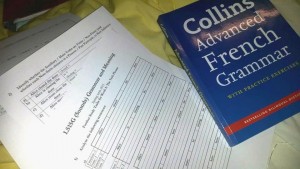Reading offers a vast array of combined degrees amongst their courses and the School of Languages is no exception to this. The most popular subject to combine English Language with in my year was English Literature, but I chose to combine it with a language, French. In Welcome Week, a question you will answer almost a hundred times is, “What are you studying?” and I quickly got used to people screwing their noses up when I told them that I did French and English Language. The question that they often followed it up with was, “Why?” Well, here’s the answer.
For me, it was always a no-brainer that I would take English Language at University – I took it at A Level and it was by far my favourite subject. I’ve always had a love of grammar and words but was never interested enough in reading the classics to choose Literature. When I came to look at where I could go and what I could study, I was overwhelmed with choices, but a combination with French was the one that struck me. I was studying it at A Level and so knew that the two subjects were a good combination.
I suppose a love of grammar meant that delving into two very grammar heavy subjects didn’t daunt me, but I would recommend my course to someone even if they didn’t love to talk about tense as much as I do. My English lectures compliment my French lessons perfectly. In first year, I learned about Phonetics and Phonology on the English side of my course, which is the study of sounds and how they make up language. Part of that was learning the Phonetic Alphabet, a way of transcribing sounds. When I then encountered some phonetic transcriptions in my French pronunciation classes, I was able to read them easily. Seeing the words transcribed helped me to understand things like the difference between how –ous and –us sound in French. And, of course, having a deeper understanding of the grammar of your own language will only help when you learn a second one.
Of course, these aren’t the only advantages of my course – an obvious one was that it provided me with the opportunity to do a year abroad. When I first applied to University, a combined degree with a language was my only real option if I wanted to do a year in another country. Now, you can do a year abroad in your third year even if you’re a pure English Language student. For me, my year abroad is an important part of perfecting my ability to use French but it’s also a good chance to explore another country’s language and culture as a student of linguistics. Whilst English is the focus of the course at Reading, you will naturally look at other languages during your studies. After all, you can’t really have a full grasp of how a language works, especially not one like English, if you haven’t taken into account the other languages of the world and how they may have influenced it. So taking a year abroad is a great chance to enhance your understanding of language.
Finally, possibly the biggest advantage of studying my course is the departments themselves. The school of Literature and Languages is like its own little community at Reading. Though the French department may have its own little corridor, you can expect to see the students and staff mingling with those from Italian and German too, and it’s the same in the English department. The departments may not be big when compared with the hundreds that take business or a science but, if you ask me, that’s better. When you’re studying something as complex and personal as language, it’s always helpful to know your fellow students and lecturers well.
So some people may turn their nose up at my degree and question why I would inflict it on myself, but it was the perfect choice for me and I would recommend it to someone else in a heartbeat.
Emma Connor

